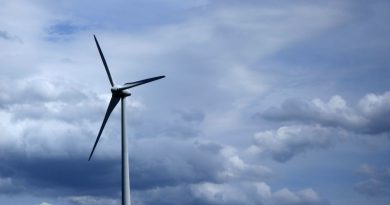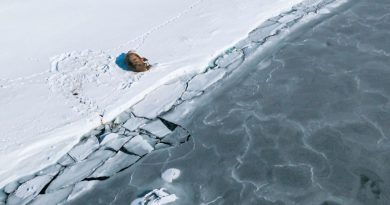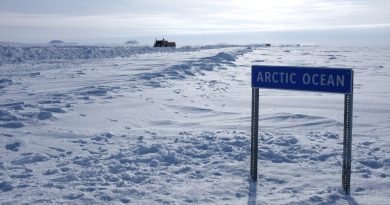Inuit from Alaska, Canada, Greenland & Russia condemn U.S. torpedoing of Arctic Council declaration
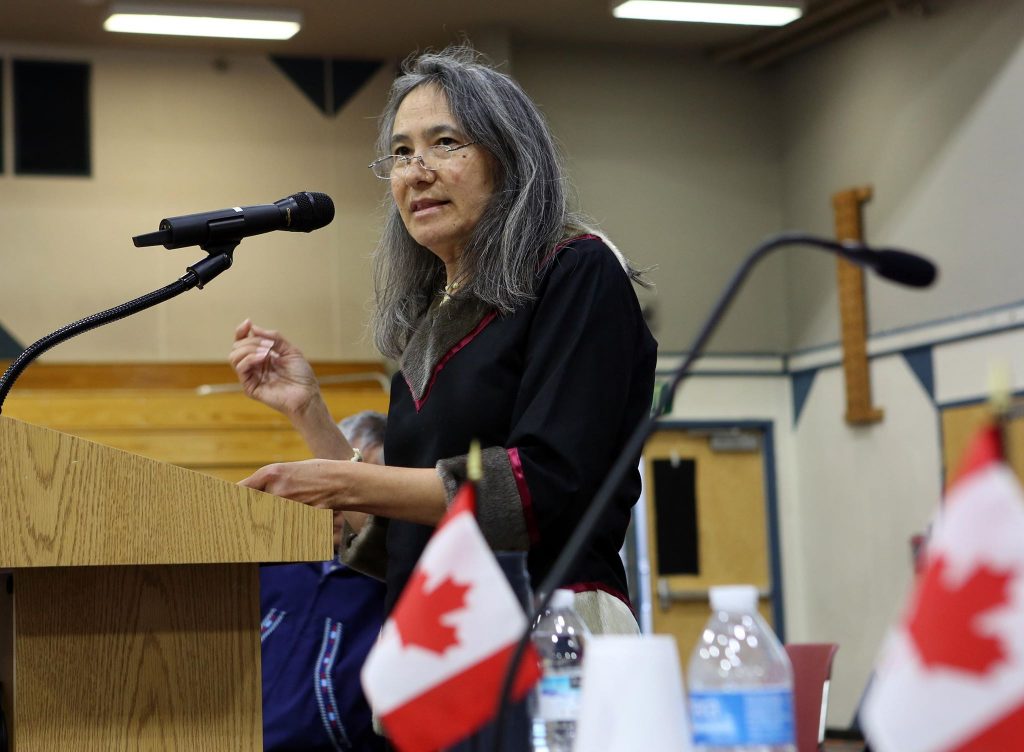
The Inuit Circumpolar Council (ICC), an organization that represents 165,000 Inuit in Alaska, Canada ,Greenland, and Chukotka, Russia, blasted the U.S. for torpedoing the Rovaniemi Declaration at Tuesday’s Arctic Council ministerial after refusing to sign on if the words “climate change” were included in the joint document.
Dalee Sambo Dorough, international chair of the ICC, which is one of the six Arctic Indigenous organizations, known as permanent participants, that make up the Arctic Council along with the eight northern countries, called the U.S. actions a lack of leadership and a “moral failure.”
“This is the first time the Arctic Council has failed to issue a declaration at the end of a two-year chairmanship, and it’s a serious blow to the future of what is supposed to be a consensus based body,”Sambo Dorough said in a statement issued late Tuesday.
“Inuit are feeling the effects of climate change everyday. While the US Government concerns itself with semantics, playing games with words, our people are witnessing the adverse impacts of climate change. What about us and our reality?”
Year formed: 1996
Arctic Council Members: Canada, Denmark (Greenland), Finland, Iceland, Norway, Sweden, Russia, United States
Permanent Participants: Aleut International Association, Arctic Athabaskan Council, Gwich’in Council International, Inuit Circumpolar Council, Russian Association of Indigenous Peoples of the North, Saami Council
Liubov Taian, the president of ICC Russia, said the reality of Arctic Inuit communities was being ignored.
“This is not just a question of words – it’s about the long-term survival of our culture and communities,” Taian said. “Our traditional Inuit territory covers 40% of the Arctic region and it is essential that governments work with us to deal with the threat of climate change throughout Inuit Nunaat, our Arctic homeland.”
Scramble for last minute compromise
The Arctic Council’s mandate is to discuss sustainable development and environmental protection in the North. The countries’ ministers and permanent participants meet biennially at the ministerial to take stock, transfer the rotating two-year chairmanship between the countries, and to sign a declaration that establishes their priorities for the next two years.
This year’s ministerial was held and Rovaniemi, Finland on Tuesday, where Finland handed the two-year rotating chairmanship of the organization over to Iceland.
But it was the first time in the Arctic Council’s history that an agreement on the final declaration couldn’t be reached.
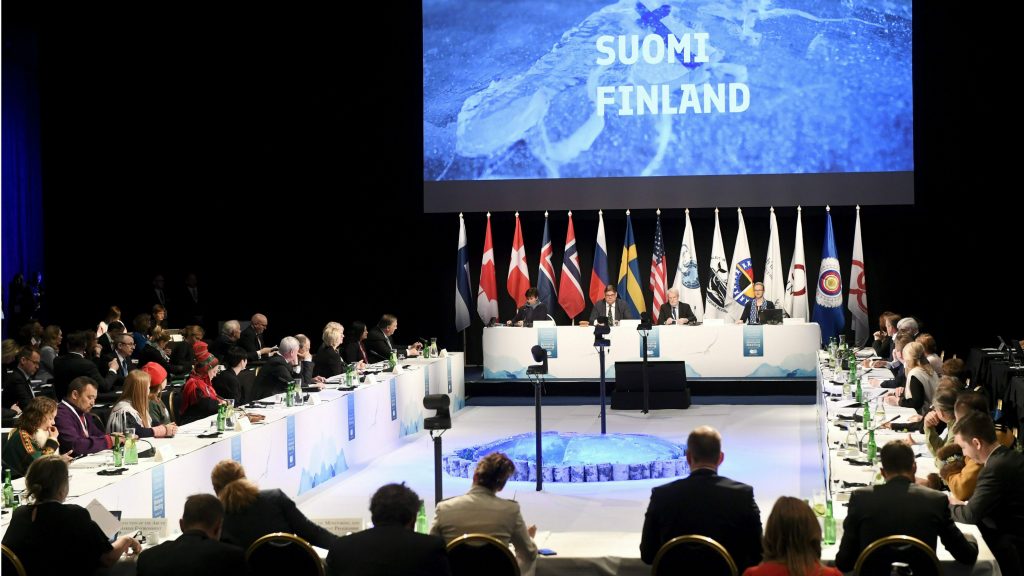
Instead, outgoing chair Finland scrambled to cobble together a last-minute compromise with the Arctic states, and issued a one page statement,that pledged a joint commitment to the “[…]well-being of the inhabitants of the Arctic, to sustainable development and to the protection of the Arctic environment,” but that made no mention of climate change or the Paris climate agreement.
Unlike the usual declarations, which are developed with input from the Arctic Council’s Indigenous organizations, the compromise Joint Ministerial Statement was put together without them.
“We are worried about the undermining of the Arctic Council’s credibility at a time when genuine leadership and a strong Arctic voice is needed,” said Hjalmar Dahl, President of ICC Greenland.
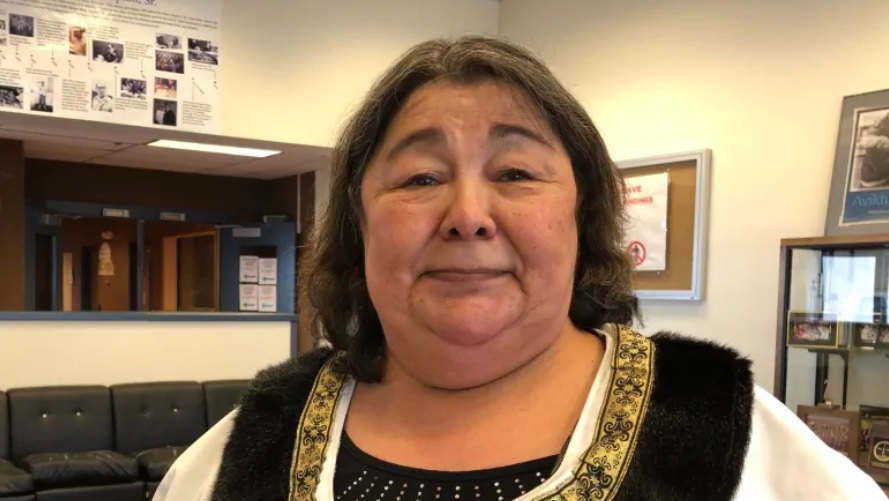
Canada’s ICC president Monica Ell-Kanayuk said U.S. actions reversed their own commitments made during their recent 2015-2017 chairmanship.
“This position was taken by the US Administration despite the fact that the 2017 Fairbanks Declaration at the end of the US Chairmanship clearly cited the effects of climate change in the Arctic and ‘the need for action at all levels,’” she said.
The U.S. has been at odds with the rest of the Arctic community over climate issues since President Trump announced his country’s withdrawal from the Paris climate deal in 2017, a move blasted by other Arctic Council member states and something that continues to be sticking point in bilateral meetings with Arctic Council nations.
James Stotts, ICC’s Alaska president, said sidelining Indigenous contributions and views was a dangerous precedent for the Arctic Council, a forum that has long prided itself for including Arctic Indigenous groups since it’s founding.
“It’s time to seriously listen to the solutions offered by ICC and the other Permanent Participants,” he said. “Its Inuit leadership expressed the unanimous view that given the challenges facing the region, now is the time for a unified response to the threat posed by climate change and its compounding spinoff effects.
“This unity is important for Inuit and all people of the Arctic, as well as the rest of the world.”
On Thursday, May 9, the Arctic Council’s permanent participants: Arctic Athabaskan Council, Aleut International Association, Gwich’in Council International, Inuit Circumpolar Council, the Saami Council, and Russian Association of Indigenous Peoples of the North issued a joint statement
“As Permanent Participants, we call upon the Member States to reaffirm their commitment to the established process of the Arctic Council, which seeks to reach consensus and solutions for the peace, stability and common good of the Arctic,” they said in the news release.
“We stress the need for Member States to meaningfully engage with Arctic Indigenous peoples and support the mandate of the Arctic Council – our full participation. The Permanent Participants welcome the dedication of those Member States who have demonstrated leadership in making tangible progress, including towards addressing the impacts of climate change and call upon the Member States to, among other things, address climate change immediately at the local, national, and international levels.”
“We thank Finland for their excellent work as the Chair of the Arctic Council from 2017 to 2019. We look forward to the incoming Icelandic Chairmanship from 2019 to 2021.”
Write to Eilís Quinn at eilis.quinn(at)cbc.ca
UPDATE: This story has been updated with a May 9th statement from the Arctic Council’s permanent participant groups.
Related stories from around the North:
Canada: U.S. stuns audience by tongue-lashing China, Russia on eve of Arctic Council ministerial, Eye on the Arctic
Finland: Finland’s Senior Arctic Official looks back at two years of Finnish Arctic Council chairmanship, Heather Exner-Pirot
Denmark/Greenland: Controversy over Greenland airports shows China still unwelcome in the Arctic, Blog by Mia Bennett
Iceland: Iceland talks Arctic, Trump’s ditching of climate accord, with U.S. Secretary of State, Eye on the Arctic
Norway: Norway rearming in Arctic to face new security landscape, The Independent Barents Observer
Russia: Russia, China step up talks over Arctic shipping, The Independent Barents Observer
Sweden: Nordic leaders stand united as they sit with Putin in Russia, The Independent Barents Observer
United States: U.S. stonewalling on climate language scuttles Arctic Council declaration, Eye on the Arctic

